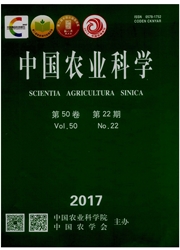

 中文摘要:
中文摘要:
【目的】在有机物料和无机氮肥的配施条件下,研究氮素在土壤中的固持与释放过程,以期达到土壤供氮与作物需氮相一致的目的。【方法l以长期定位试验不同施肥处理土壤(不施肥,NF;施用氮磷钾化肥,NPK;厩肥与化肥配施,MNPK)为研究对象,采用盆栽试验研究化学氮肥及其与秸秆配施在不同肥力土壤中的固持与供应。【结果】与未施氮肥(对照)相比,单施尿素对NF处理土壤小麦籽粒产量无显著影响,而显著提高了NPK和MNPK处理土壤小麦籽粒产量;MNPK处理土壤氮肥利用率(67%)显著高于NPK(56%)和NF(19%)处理土壤。与施用氮肥处理相比,秸秆与尿素配施显著降低了小麦产量和氮素利用率,但MNPK处理土壤小麦产量及氮肥利用率(11%)仍显著高于NPK处理(7%);秸秆与尿素配施降低了当季小麦对施入氮素的吸收利用,小麦收获时不同施肥处理土壤有79%-88%施入的氮素未被吸收利用。【结论】有机肥与化肥长期配施在协调土壤氮素供应,提高作物产量及氮肥利用率方面具有突出作用。
 英文摘要:
英文摘要:
[ Objective ] A pot experiment was conducted to evaluate the effect of long-term different fertilization treatments on N retention and supply in soils after the addition of straw and urea-N. [Method] Three soils (NF, no fertilizer; NPK, applied inorganic N, P, K fertilizer; and MNPK, combined application of manure and inorganic N, P, K) were sampled from a long-term different (19 years) fertilization experiments in Yangling, Shaanxi. And three rates of N fertilizer (0, 100 mg.kg1 of urea-N, and 50 mg.kg-1 of urea-N + 50 mg'kg"1 of straw-N) were added into the three different fertilized soils to study N immobilization and supply during the wheat growth. [ Result] Addition of N fertilizer had no effect on grain yield of wheat in the NF soil, while it significantly increased grain yield of wheat in NPK and MNPK soils. When only urea-N was added, the use efficiency of the added urea-N in the MNPK soils was as high as 67%, and it was significantly (P〈0.05) higher than that in the NPK (56%) and NF soils (only 19%); And wheat yield of the MNPK soil was also significantly (P〈 0.05) higher than that of NPK and NF soils. Compared with only addition of urea-N, the combined addition of straw and urea-N significantly (P〈0.05) decreased grain yield and N use efficiency. For the MNPK soil, the N use efficiency was only 11%, but it was still significantly higher than that of NPK soil (7%). After harvesting, 79-88% of added N in the treatment of combined addition of inorganic N and straw was not absorbed by wheat in the three soils. [Conclusion] It was concluded that the long-term application of manure and NPK fertilizers has a high ability to modulate the N supply of soil by adjusting the N retention and release processes, and increases grain yield and N use efficiency.
 同期刊论文项目
同期刊论文项目
 同项目期刊论文
同项目期刊论文
 期刊信息
期刊信息
